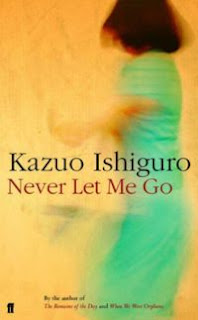
Never Let Me Go is the quietly depressing story of a woman in her early thirties reminiscing about life at a rural boarding school. Her tone is light but never humorous and as layers of personal history build up it becomes clear that the wider, political and social history of her world is darkly different to our own.
The setting is Britain in the late '90s, Ishiguro tells us. But, as he likes to point out, location is not everything in his books; indeed, it is either an afterthought or an evocation of myth rather than a tie to historicism or even, necessarily, realism*. Like a pop lyricist, Ishiguro uses words to find profundity in shallow mental and emotional terrain.
Here, the plot is background to the narrator's voice, so naively familiar to anyone who has read Remains of the Day. The prose (and indeed the world it describes) is steeped in euphemisms. The same kind of fragile beauty that held the remains of the day together is evident here and it is no less heart-breaking.
Ishiguro has acheived something remarkable. He has disguised a powerful piece of speculative fiction as mainstream literature. This is true science fiction, its themes human and yet, hauntingly, not quite so. It is a book simple, elegant and terribly sad. Again, very much like his earlier understated masterpiece.
There is, despite the author's insistence that setting is a minor concern, something quite distinctly English in the air. A thin drizzle seems to pervade the post-pastoral landscape and the politeness, hideously apparent in those ubiqitutous euphemisms, is delightful, disarming and, finally, disgusting.
It's also, almost in passing, an almost entirely hopeless vision. If this is an allegory of modern life as many critics have thought it's an unbelievably bleak one. Love is a momentary diversion on the road to the grave. This is not only a culture of consumers but a culture that has turned consumers into products.
We're presented with a dystopia as dark and immanent as 1984, The Handmaid's Tale or Brave New World and, indeed, it is the latter two that seem to be lurking in the wings. There is the stink of failed utopia in the bloody clash of science and ethics.
In Summary!
There really is very little to complain about. It's refreshingly different and disturbingly familiar. A quick read and a Hell of an experience, quite literally. In fact, if there were any criticism I'd throw at the book, it goes back to my first comments; there's not a single laugh to be had :(
Similair To?
The Handmaid's Tale, Brave New World, Cloud Atlas & Remains of the Day.
* check out these interviews: http://service.spiegel.de/cache/international/0,1518,378173,00.html & http://www. observer.guardian.co.uk/review/story/0,6903,1418284,00.html )
Here, the plot is background to the narrator's voice, so naively familiar to anyone who has read Remains of the Day. The prose (and indeed the world it describes) is steeped in euphemisms. The same kind of fragile beauty that held the remains of the day together is evident here and it is no less heart-breaking.
Ishiguro has acheived something remarkable. He has disguised a powerful piece of speculative fiction as mainstream literature. This is true science fiction, its themes human and yet, hauntingly, not quite so. It is a book simple, elegant and terribly sad. Again, very much like his earlier understated masterpiece.
There is, despite the author's insistence that setting is a minor concern, something quite distinctly English in the air. A thin drizzle seems to pervade the post-pastoral landscape and the politeness, hideously apparent in those ubiqitutous euphemisms, is delightful, disarming and, finally, disgusting.
It's also, almost in passing, an almost entirely hopeless vision. If this is an allegory of modern life as many critics have thought it's an unbelievably bleak one. Love is a momentary diversion on the road to the grave. This is not only a culture of consumers but a culture that has turned consumers into products.
We're presented with a dystopia as dark and immanent as 1984, The Handmaid's Tale or Brave New World and, indeed, it is the latter two that seem to be lurking in the wings. There is the stink of failed utopia in the bloody clash of science and ethics.
In Summary!
There really is very little to complain about. It's refreshingly different and disturbingly familiar. A quick read and a Hell of an experience, quite literally. In fact, if there were any criticism I'd throw at the book, it goes back to my first comments; there's not a single laugh to be had :(
Similair To?
The Handmaid's Tale, Brave New World, Cloud Atlas & Remains of the Day.
* check out these interviews: http://service.spiegel.de/cache/

1 comment:
Good words.
Post a Comment